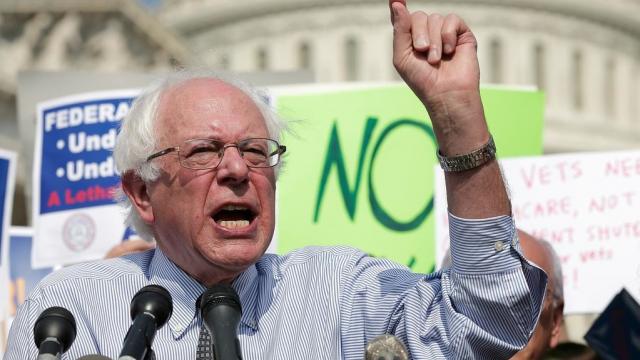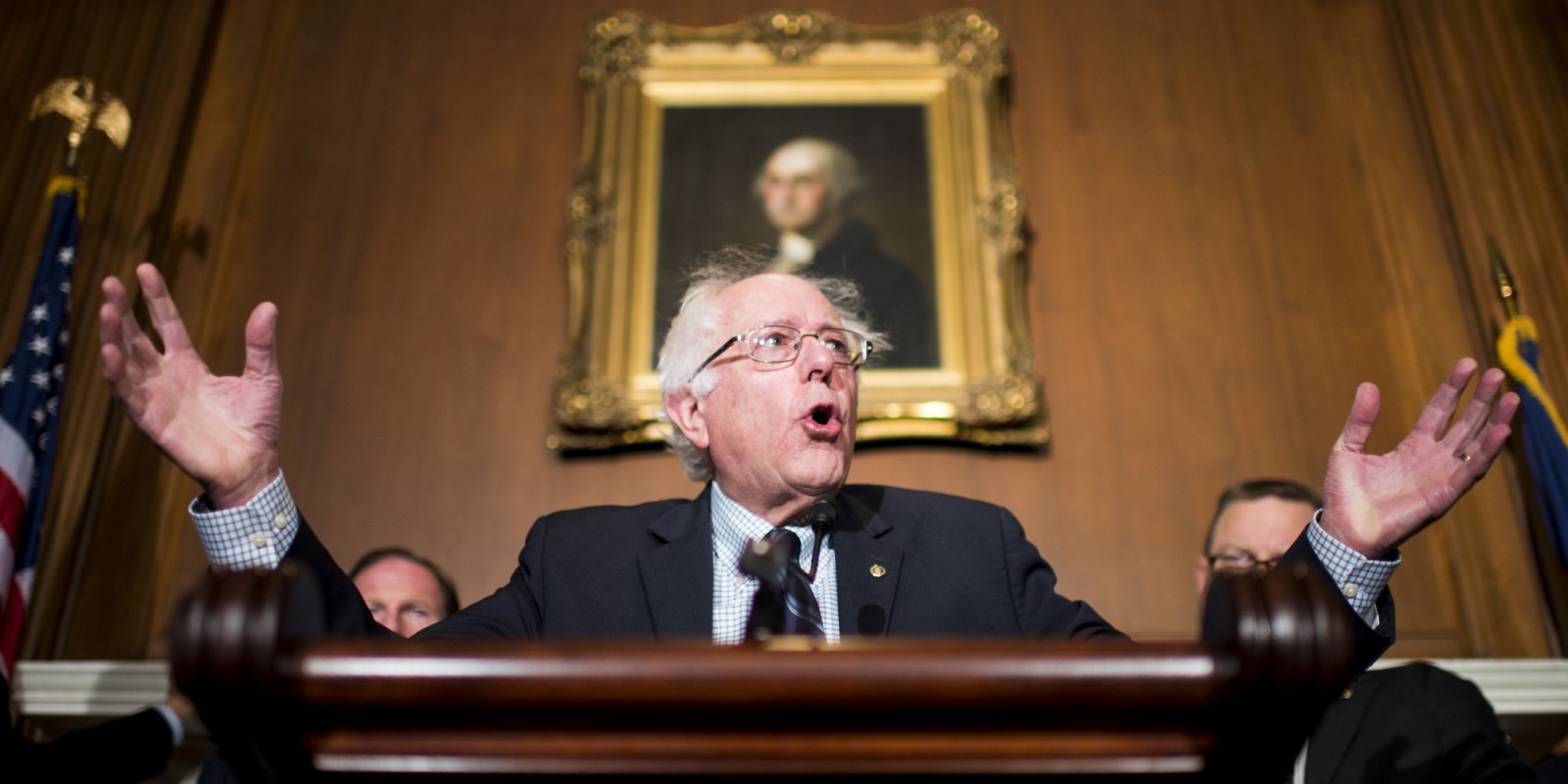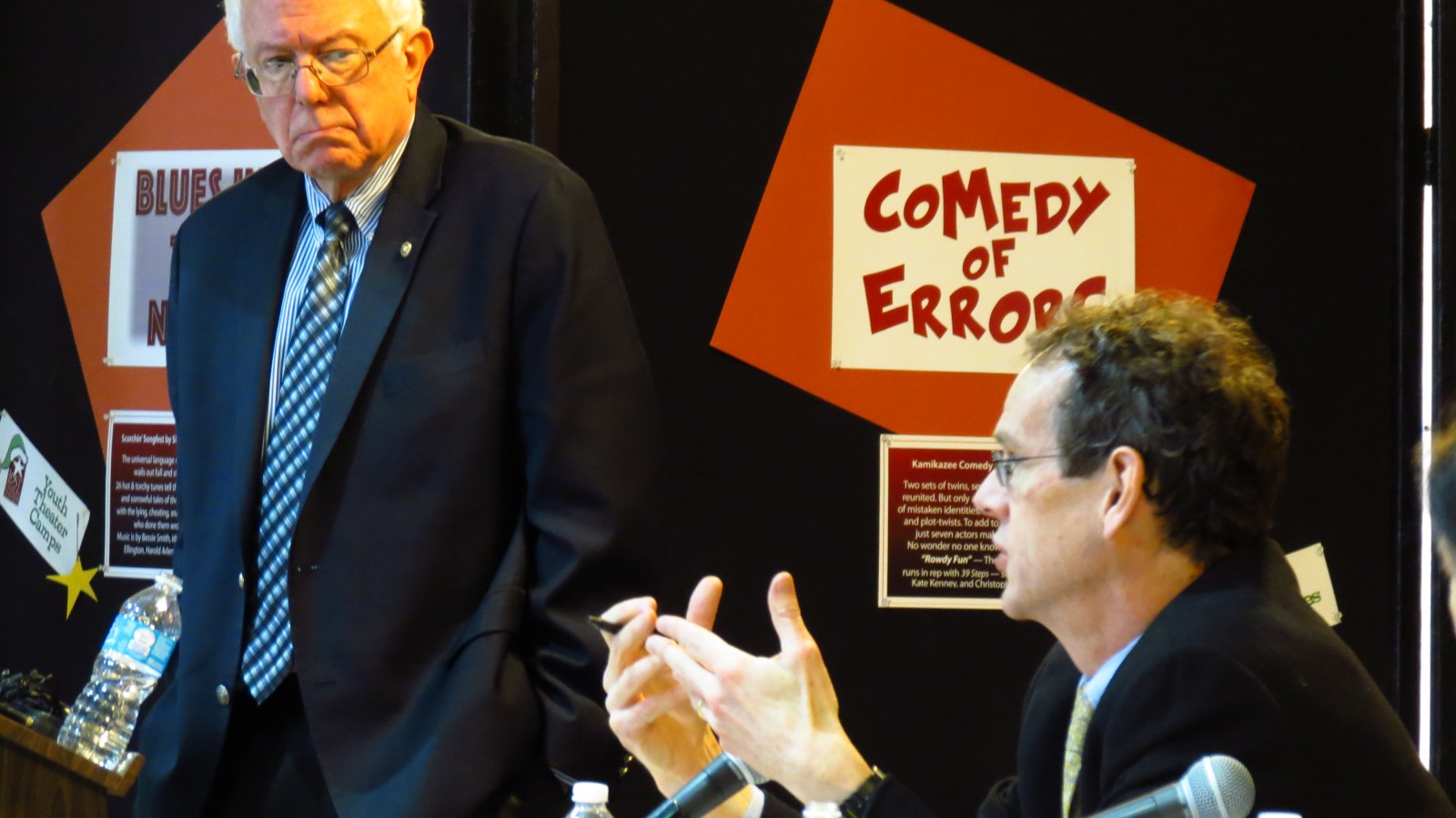
MONTPELIER, Vermont – Shuffling into the downtown Montpelier auditorium, visitors unbuttoned their jackets, removed their hats and scarves and tried to shake off the New England cold as they filed upwards into the second floor theater hall to hear U.S. Senator Bernie Sanders speak to the crisis of NSA surveillance.
Though most of those in attendance would likely profess a “progressive” or “liberal” political persuasion, the topics under discussion – as well as the politics of those attending – bridged the divides between left and right, bringing to attention the gravity of the spying issue and its reach beyond typical partisan divisions.
Sanders, along with David Cole of the Georgetown University School Of Law, Heidi Boghosian of the National Lawyers Guild (NLG), and Vermont Congressman Peter Welch, had assembled for the town hall meeting to discuss the politics of ongoing NSA domestic surveillance programs, corporate interests in data gathering and sale, and the continuing series of leaked revelations offered by whistleblower Edward Snowden.
Driving home the importance and severity of the highly secretive U.S. spying programs, which collect and retain virtually all forms of electronic data on Americans under the auspices of national security, Sen. Sanders described the matter as one possessing “huge, huge consequences,” and wasted no time drawing comparisons to George Orwell’s dystopian novel 1984. "Technology is exploding and when Orwell wrote 1984, he had no idea where we would be today," said Sanders.
Blaming a complacent media that kept the public in the dark about the surveillance state for so long, Sanders pointed out that conventional news outlets have become so headline driven, politically divisive and corporatized that they often miss the big stories – NSA spying being among the biggest. He also expressed worry over the growing trend of media “self censorship,” which he said he sees occurring even among today’s more active and aggressive journalists.
As restrictions on what constitute protected sources and speech continue to tighten, and protections for journalists reporting on sensitive issues continue to erode, Sanders highlighted concerns shared by many regarding intrusions into personal privacy and, in some cases, obstructions of basic liberties that have caused some would-be whistleblowers and others to shy away from important stories that could result in hearings, questionings, arrests – and even what some have theorized to be politically-motivated assassinations.
During his brief speech, Sanders sought to highlight bipartisan efforts to address NSA overreach in both the House and Senate, hailing Vermont Sen. Pat Leahy’s work with Republican Rep. Jim Sensenbrenner – who originally wrote section 215 of the PATRIOT Actauthorizing warrantless business record checks.
Sanders openly challenged the notion that there is much in the way of public, partisan or ideological support for domestic spying. He stated that standing against secretive mass data collection represented the height of opposition to “big government” – and that the fight to protect privacy was against not only big government, but “big brother government.”
Congressman Peter Welch, who praised the Vermont senator for his 2001 vote against the USA PATRIOT Act, acknowledged that while terrorism is a threat worldwide, efforts by the NSA and 15 other intelligence and law enforcement agencies operating in secrecy have made congressional oversight effectively irrelevant.
For her part, Heidi Boghosian of the National Lawyers Guild spoke about what she called the three biggest corporate data aggregators – Experion, Axion and Choicepoint – which specialize in collecting and selling bulk data to everyone from government to marketing and sales corporations.
Choicepoint, which enjoys an $8 million contract with the federal government to provide data to agencies like ATF, DEA and others, operates in such a fashion that it effectively escapes 4th Amendment restrictions on privacy violations, she said.
Additionally, Boghosian cited the case of a Target retail customer in Minnesota whose father inadvertently became aware of her pregnancy through ads that showed up, generated by algorithmic analysis of his daughter’s shopping habits involving child care products.
Most Americans have by now become familiar, and even in some cases comfortable, with current data tracking by businesses and marketing specialists. But the depth and degree to which such data collection and analyses can provide intrusive, personal – and sometimes deeply private – details about individuals is now frightening people in the mainstream, Boghosian said. Worse, the development of shared corporate and law enforcement intelligence ‘fusion centers’, which evolved after 9/11, is turning America into what Boghosian described as a "co-dependent corporate intelligence government state.”
When a Middlebury, Vermont, resident and self-proclaimed Libertarian named Dan rose to speak, he asked Sen. Sanders to respond to President Obama’s recent promise to reform the NSA programs – to which Sanders replied: “As a politician, you can say a lot of things that sound good but don’t really mean anything.”
"I think what our job is," Sanders continued, "and I think conservatives and libertarians and progressives can [work] together on this issue, is to stand up and say, 'You know what, the issue of human freedom and the issue of privacy rights is a major political issue for us. And if you are not prepared as a candidate to defend privacy rights, don't expect my vote.'"
Responding to a similar question from another caller from Ohio, Sanders doubled down on his message:
"I think most Americans, ironically, regardless of their political views, perceive that we need in a general sense a political revolution in this country."
3 WAYS TO SHOW YOUR SUPPORT
- Log in to post comments














